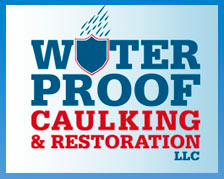 If you have started to experience drafts, moisture intrusion or the presence of pests in areas where you do not want them, it may be time for exterior caulking of certain areas of your building. However, entering into the caulking aisle in a home improvement store can be overwhelming, with a huge variety of options to choose from.
If you have started to experience drafts, moisture intrusion or the presence of pests in areas where you do not want them, it may be time for exterior caulking of certain areas of your building. However, entering into the caulking aisle in a home improvement store can be overwhelming, with a huge variety of options to choose from.
How do you know which waterproofing caulk to use on your building? Each type of caulk material is designed for a specific type of use; using the wrong kind will shorten its working life, and it could prevent the caulk from working properly at all or cause problems later when it needs to be replaced. To determine which type of caulk you need, you must first understand how it works and how (and where!) you plan to use it.
View Commercial Exterior Caulking Services
What Does Exterior Caulk Do For Your Building?
Caulk is an important but often overlooked aspect of a building because, if done well, it blends right in. Caulk is the material that seals joints, gaps and other vulnerabilities, such as those around windows and doors, the gaps between tile and the edges of sinks and toilets where they connect to the rest of the home.
If your caulk is old and worn out, it can no longer perform its typical job of forming a tight seal at these critical junctures. That seal is important because it prevents intrusion of a number of unwanted elements, such as water and drafts. You could be spending more money on utilities than you need to if your building is drafty, and seeping water could be damaging your interior surfaces, leading to bigger repairs later.
As you consider the best waterproofing caulk to recaulk with, be sure to understand which type of material is right for the job. The following are some of the most common caulks you can choose from and when you should (and should not) use them.
Latex Caulk: Acrylic and Vinyl
 Latex caulk is some of the most common, and it is generally what people think of when they envision installing caulk in their home or commercial building. Acrylic latex caulk can be appealing because it is cheap, but it is only intended for minor indoor use because it is not very good at creating a waterproof seal.
Latex caulk is some of the most common, and it is generally what people think of when they envision installing caulk in their home or commercial building. Acrylic latex caulk can be appealing because it is cheap, but it is only intended for minor indoor use because it is not very good at creating a waterproof seal.
Instead, use it to patch small holes before you paint. While vinyl latex caulk is more durable and waterproof, it is much tougher, which means that you will need to be experienced in installing caulk or you risk this tough material adhering improperly and then being difficult to remove. If you decide that latex caulk is right for you, vinyl latex is the only one suitable for outdoor use.
Sealant With And Without Silicone
Sealant is usually used to—as you might expect—seal gaps. Acrylic sealant is most commonly used in between tiles, but be aware that it is not suitable as the only sealant you use; rather, acrylic sealant is meant to patch small areas only. Siliconized sealant is tougher (though more difficult to clean up) and can be used outdoors, though you likely have better options for outdoor use.
Pure Silicone Caulking
When it comes to waterproofing and longevity, you do not really see material that functions better than pure silicone. It is perfect for extremely damp locations and can last for decades. However, pure silicone does not cling to porous surfaces like wood, brick and drywall very well, limiting its use.
Butyl Rubber and “Liquid Nails”
Butyl rubber is the specific type of adhesive you see used with roofing because it waterproofs well and lasts for a long time. However, it is not suitable for indoor use because it is messy and challenging to apply in an aesthetically pleasing manner.
 Similarly, “liquid nails,” which is a more casual term for adhesive caulk, is a strong glue that resists mold and mildew, but it poses a significant challenge in the cleanup department. This means that if you ever need to make repairs or caulk again—and you will, because caulk does not last forever—you will struggle to remove adhesive caulk cleanly without damaging your surfaces.
Similarly, “liquid nails,” which is a more casual term for adhesive caulk, is a strong glue that resists mold and mildew, but it poses a significant challenge in the cleanup department. This means that if you ever need to make repairs or caulk again—and you will, because caulk does not last forever—you will struggle to remove adhesive caulk cleanly without damaging your surfaces.
Let Our Exterior Caulking Professionals Help You Choose
Even if you know what each type of caulk does, choosing between two similar materials and making the right choice for your specific use can feel overwhelming. The experts at Waterproof Caulking & Restoration have years of experience using this material and would be happy to help you understand what your project requires. Reach out to ask any questions you may have or to entrust your job to the pros.
